International Toy Fair Nuremberg 2009
Internationale Spielwarenmesse Nürnberg 2009
| x |
|
|
|
|
|
|
|
|
|
|
|
|
|
|
|
|
|
|
|
|
|
|
|
|
|
|
|
|
|
|
|
|
|
| Abacusspiele |
|
| x |
|
|
|
|
|
|
|
|
|
|
|
|
|
|
|
|
|
|
|
|
|
|
|
|
|
|
|
|
|
|
|
|
|
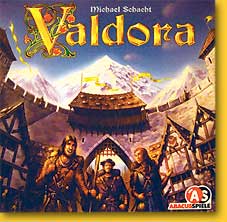 |
|
In 'Valdora', players acquire equipments or assignments. Only through their equipment they can dig for gold and gems. Through taking on assignments and delivering the required gems on the right location, a player scores points as well hire craftsmen. Each craftsman is specialised in either gold, silver or specific gems. The first player who has the required craftsmen in a specialisation, gets a workshop. Workshops earn special points. At game end, points are scored for workshops, crafstmen and gems. |
|
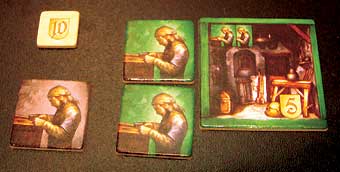 |
| x |
|
|
|
|
|
|
|
|
|
|
|
|
|
|
|
|
|
|
|
|
|
|
|
|
|
|
|
|
|
|
|
|
|
In a turn, a player must move his token anywhere along a path. He may go as many fields as he wants, but must stop in the first city entered. When carrying food, he may continue his movement beyond the first city but must stop in a second city entered; when doing this, he loses the food.
After his move, a player performs any one of the following actions:
- acquire equipment or assignments
- load gems
- accomplish assignments
- refill cash
- take food.
Which action a player can perform, depends on the field he currently is on. On the city fields, he can buy as many equipment or assignments as he likes; each equipment card costs 1 gold, each assignment card 1 silver. However, he only can buy the current page/card from the book the card is displayed on; if he wants to buy an other card than the one currently on display, he has to pay if he wants to flip the page/card more than one page. |
|
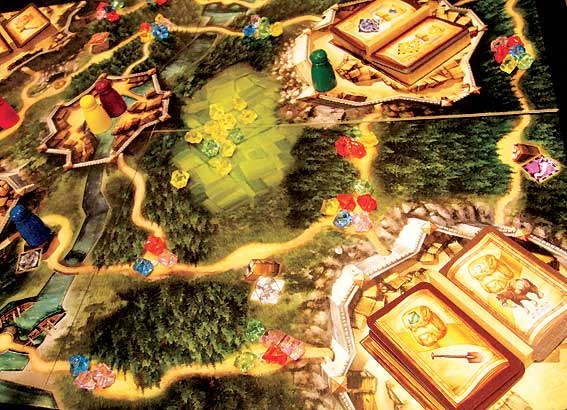 |
| x |
|
|
|
|
|
|
|
|
|
|
|
|
|
|
|
|
|
|
|
|
|
|
|
|
|
|
|
|
|
|
|
|
|
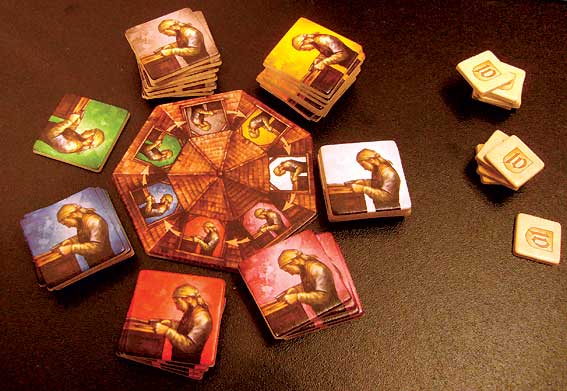 |
|
Loaded gems go into a player's rucksack; one of the equipment cards. Each rucksack can hold only one gem. On streets, a player can load all gems he has the right equipment for; in harbours he may load as much as there are ships in the harbour.
To fullfill an assignment, a player must move to the house of the principal and hand over the required gems. Each time he has done so, he gets a crafstman from the craftsmen table in the colour of the principal. When he has the required number of crafstmen as indicated on the workshop for that colour, he may take it. From now on, the player gets a bonus chit for each fullfilled assignment in the same colour as workshop .
When a player ends on a silver mine, he refills his cash to 6 coins; on a city a player may take food so he can move through a first entered city.
The game ends when the craftsmen table only has craftsmen of one kind. Points are given for fullfilled assignments, bonus chits, workshops, each type of craftsmen and each gem. |
|
| x |
|
|
|
|
|
|
|
|
|
|
|
|
|
|
|
|
|
|
|
|
|
|
|
|
|
|
|
|
|
|
|
|
|
| Valdora, Michael Schacht, Abacusspiele, 2009 - 3 to 5 players, 10 years and up, 60 minutes |
|
| x |
|
|
|
|
|
|
|
|
|
|
|
|
|
|
|
|
|
|
|
|
|
|
|
|
|
|
|
|
|
|
|
|
|
| x |
|
|
|
|
|
|
|
|
|
|
|
|
|
|
|
|
|
|
|
|
|
|
|
|
|
|
|
|
|
|
|
|
|
| x |
|
|
|
|
|
|
|
|
|
|
|
|
|
|
|
|
|
|
|
|
|
|
|
|
|
|
|
|
|
|
|
|
|
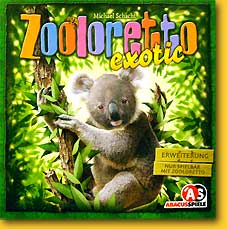 |
|
Guide your visitors through the zoo, by placing exotic animals such as snakes on your board. Each time you place such an animal, you may move your visitor 1 or 2 spaces ahead, and move the other players visitors back.
Specific stands also move the visitors.
Zooloreto Exotic, Michael Schacht, Abacusspiele, 2009 - 2 to 5 players, 8 years and up, 45 minutes |
|
| x |
|
|
|
|
|
|
|
|
|
|
|
|
|
|
|
|
|
|
|
|
|
|
|
|
|
|
|
|
|
|
|
|
|
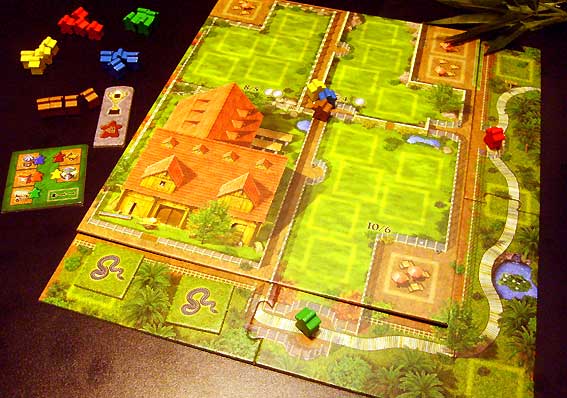 |
|
| x |
|
|
|
|
|
|
|
|
|
|
|
|
|
|
|
|
|
|
|
|
|
|
|
|
|
|
|
|
|
|
|
|
|
| x |
| x |
|
|
|
|
|
|
|
|
|
|
|
|
|
|
|
|
|
|
|
|
|
|
|
|
|
|
|
|
|
|
|
|
|
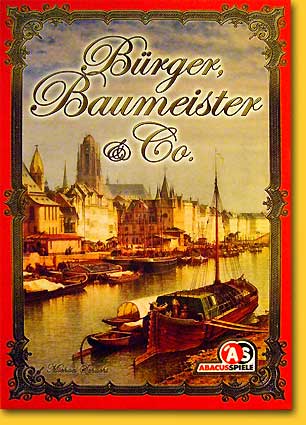 |
Players start with three randomly drawn chits that they keep secret to other players. Each turn they place one in a quarter of the matching colour. They score for the value on the chit, plus for each matching symbol for chits already placed in that quarter; there are three symbols: fields, houses and mansions.
Most quarters give a reward of one gold piece, three quarters in each colour give a +2 ofnthe placed chit; chits come in values two and three.
At the end of their turn, players refill their hand with a chit from the rondel; the chit on the position of the mayor is free; all others cost one or two gold.
Players have three cranes to make special scores during a game: it either doubles the points they make in a turn, or give a plus four on the score; each quarter shows how can be scored. To place a crane - and make the special score, two gold must be paid.
The game ends when there is no refill of chits on the rondel possible. |
|
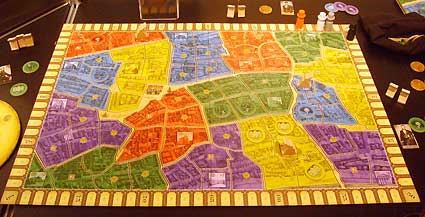 |
| xx |
|
|
|
|
|
|
|
|
|
|
|
|
|
|
|
|
|
|
|
|
|
|
|
|
|
|
|
|
|
|
|
|
|
Bürger, Baumeister & Co., Michael Schacht, Abacusspiele, 2009 - 2 to 4 players, 8 years and up, 45 minutes |
|
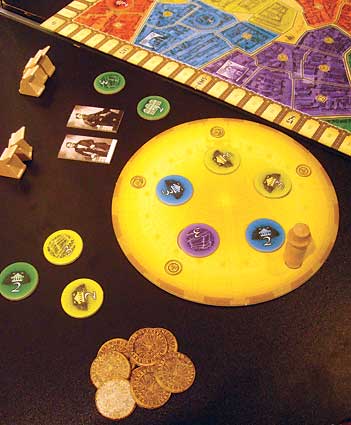 |
|
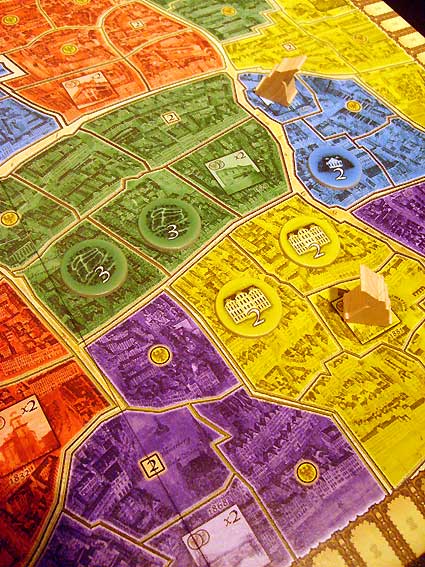 |
| xx |
|
|
|
|
|
|
|
|
|
|
|
|
|
|
|
|
|
|
|
|
|
|
|
|
|
|
|
|
|
|
|
|
|
| x |
|
|
|
|
|
|
|
|
|
|
|
|
|
|
|
|
|
|
|
|
|
|
|
|
|
|
|
|
|
|
|
|
|
| x |
|
|
|
|
|
|
|
|
|
|
|
|
|
|
|
|
|
|
|
|
|
|
|
|
|
|
|
|
|
|
 |
|
|
|
|
|
|
|
|
|
|
|
|
|
|
|
|
|
|
|
|
|
|
|
|
|
|
|
|
|
|
|
|
 |
|
|
|
|
|
|
|
|
|
|
|
|
|
|
|
|
|
|
|
|
|
|
|
|
|
|
|
|
|
|
|
|
 |
|
|
|
|
|
|
|
|
|
|
|
|
|
|
|
|
|
|
|
|
|
|
|
|
|
|
|
|
|
|
|
|
 |
|
|
|
|
|
|
|
|
|
|
|
|
|
|
|
|
|
|
|
|
|
|
|
|
|
|
|
|
|
|
| x |
|
|
|
|
|
|
|
|
|
|
|
|
|
|
|
|
|
|
|
|
|
|
|
|
|
|
|
|
|
|
|
|
|
 |
|
|
|
|
|
|
|
|
|
|
|
|
|
|
|
|
|
|
|
|
|
|
|
|
|
|
|
|
|
|
|
|
|
|
|
|
|
|
|
|
|
|
|
|
|
|
|
|
|
|
|